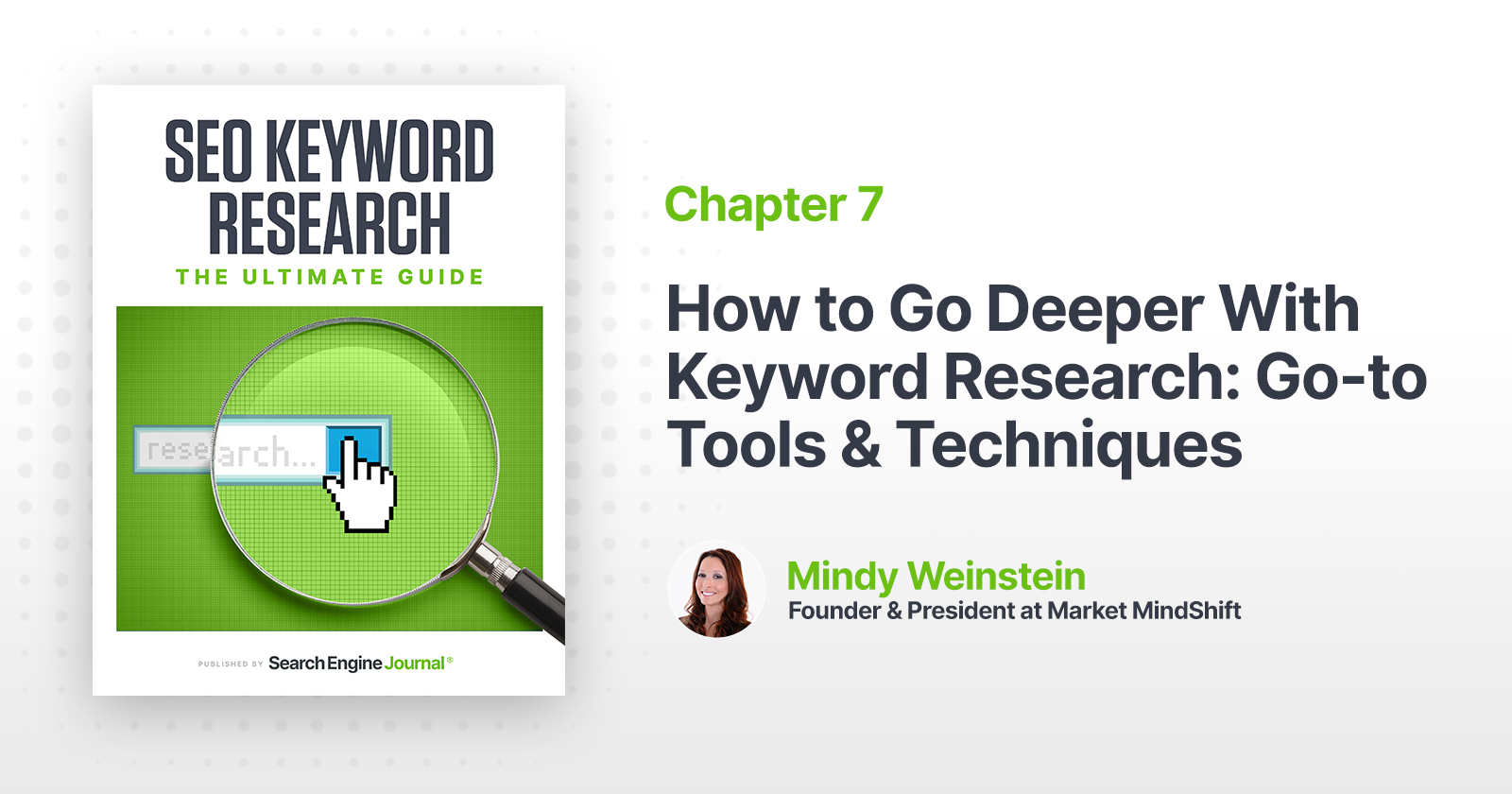
What do real customers search for?
It seems like a straightforward question, right?
But once you start digging into research and data, things become muddled.
A word or phrase might be searched for often, yet that fact alone doesn’t mean those are your customers.
When you also factor in voice search and intent, it makes the entire keyword research process even more complicated.
While a paid search campaign will give us insight into our “money” keywords – those that convert into customers and/or sales – there are also many other ways to discover what real customers search.
It’s your responsibility to drive organic traffic to your clients’ website.
But that’s not the only responsibility.
If you have been in SEO for even a minute, you know the questions that come up:
How does that traffic play into our ROI?
Are those visitors converting?
In SEO, you still experience the burden of getting visitors who will turn into leads, customers, or sales.
Advertisement
Continue Reading Below
That is where this deep keyword research process can help you.
Keyword Evolution
We are in an era where intent-based searches are more important to us than pure volume.
As the search engines strive to better understand the user, we have to be just as savvy about it too, meaning we have to know a lot about our prospects and customers.
In addition, we have to consider voice search and how that growth will impact our traffic and ultimately conversions.
Most of us are already on this track, but if you are not or want to sharpen your research skills, there are many tools and tactics you can employ.
Below are some go-to tools and techniques that can make the difference between average keyword research and targeted keyword research that leads to interested web visitors.
1. Get to Know the Human(s) You’re Targeting
You need to really know your target audience.
Take the extra step to learn the questions customers are asking and how they describe their problems.
Advertisement
Continue Reading Below
In marketing, we need to focus on solving a problem.
SEO is marketing. That means our targeted keywords and content focus should be centered on this concept.
An analysis of the audience can help you get to know the human(s) you’re targeting. It makes your keyword research more personal and relevant.
Read more: How to Know Your Audience to Master Your Marketing Campaigns
2. Go Beyond Traditional Keyword Tools
Keyword research tools are great for streamlining the process of finding some great words and phrases, especially the tools that provide suggested or related terms that help us build our lists.
Don’t forget about the not-so-obvious tools, though.
Demographics Pro is designed to give you detailed insights into social media audiences, which in turn gives you a sense of who might be searching for your brand or products.
You can see what they’re interested in and what they might be looking for.
It puts you on the right track to targeting words your customers are using versus words your company believes people are using.
You can also view audience information on Audiense, which provides details about the people you are trying to attract. Through Audiense, you can even see hashtags and words they are using (i.e., keyword opportunities):
You can glean similar data about your prospective customers by using a free tool, Social Searcher.
It’s not hard to use – all you have to do is input your keyword(s).
Advertisement
Continue Reading Below
You can also select the source and choose the post type. You can see recent posts, users, sentiment, and even related words.
Here’s an example of a Social Searcher report:
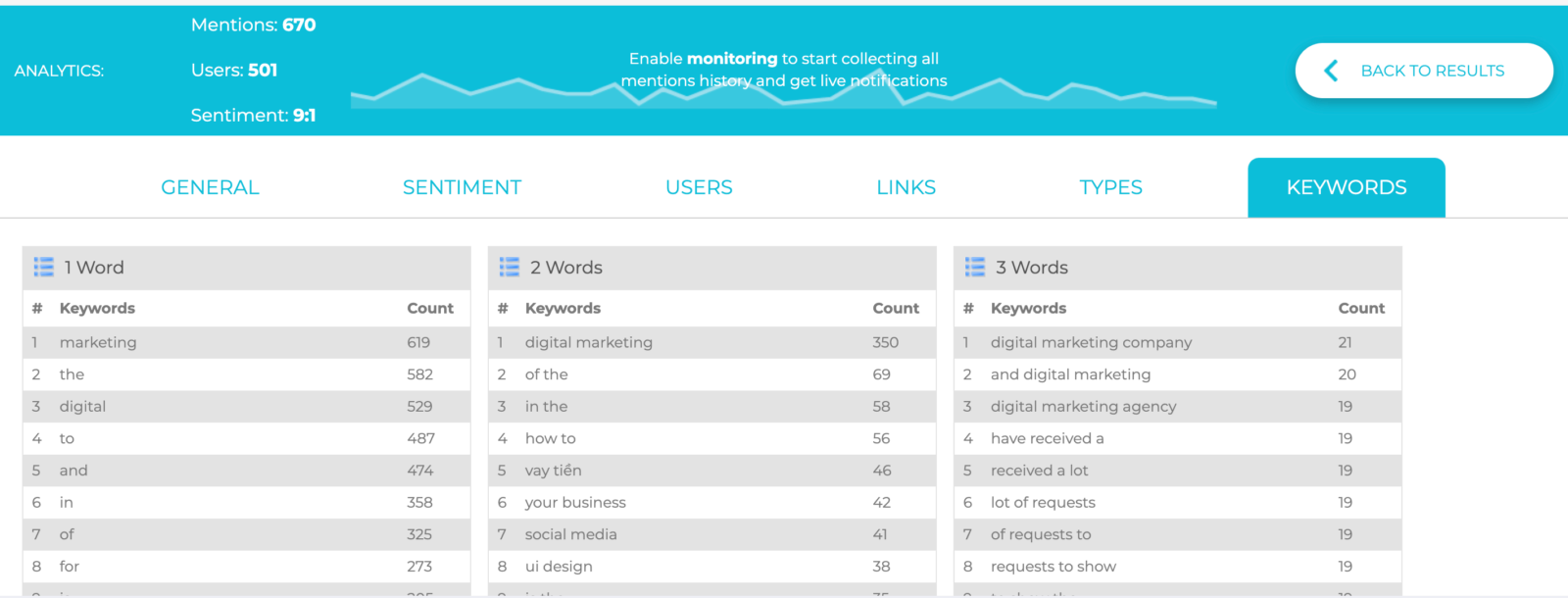 Screenshot from Social Searcher, June 2021
Screenshot from Social Searcher, June 2021Let’s say you want to create and optimize videos for certain keywords.
This tool allows you to filter by YouTube so you can see what is already out there and get insight into how you might optimize your videos.
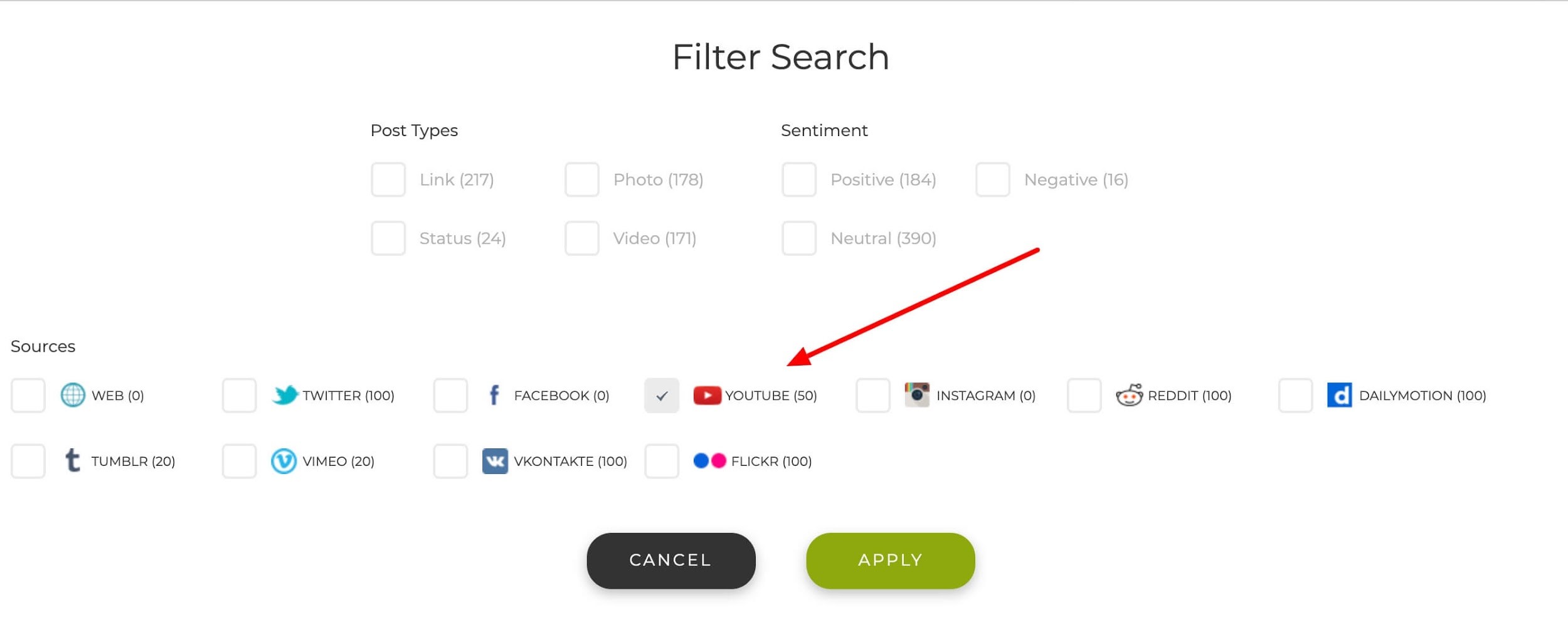 Screenshot from Social Searcher, June 2021
Screenshot from Social Searcher, June 2021Another great tool is Seed Keywords.
 Screenshot from Seed Keywords, June 2021
Screenshot from Seed Keywords, June 2021It is especially helpful if you are struggling with your keywords.
Advertisement
Continue Reading Below
This tool makes it possible to create a search scenario that you can then send to your friends.
It is a huge help if you are in a niche industry and it is hard to find keywords.
Once you have created the search scenario, you get a link that you can send to people.
The words they use to search are then collected and available to you.
These words are all possible keywords.
3. Determine Trends
To capture relevant and timely traffic, you need to identify trending keywords.
For instance, if you are optimizing a website that has seasonal products or services, you need to know what people are searching for and when.
During the COVID-19 pandemic, there were all types of keyword trends that were beyond the obvious words and phrases.
As an example, people were searching for information to avoid weight gain and how to move a team to a virtual environment.
Google Trends is the best source to locate this information.
Advertisement
Continue Reading Below
Be sure to filter by date and even location, if applicable.
4. Dig Into Intent
Once you get a feel for some of the keywords you want to target, it’s time to take it a step further.
You want to know what type of content is ranking for those keywords, which gives you an idea of what Google, and the searchers, believe the intent to be.
For the sake of providing a simple example (there are many other types of intent that occur during the buyer’s journey), let’s focus on two main categories of intent: buy and know.
Let’s say you’re targeting the term “organic coffee”:
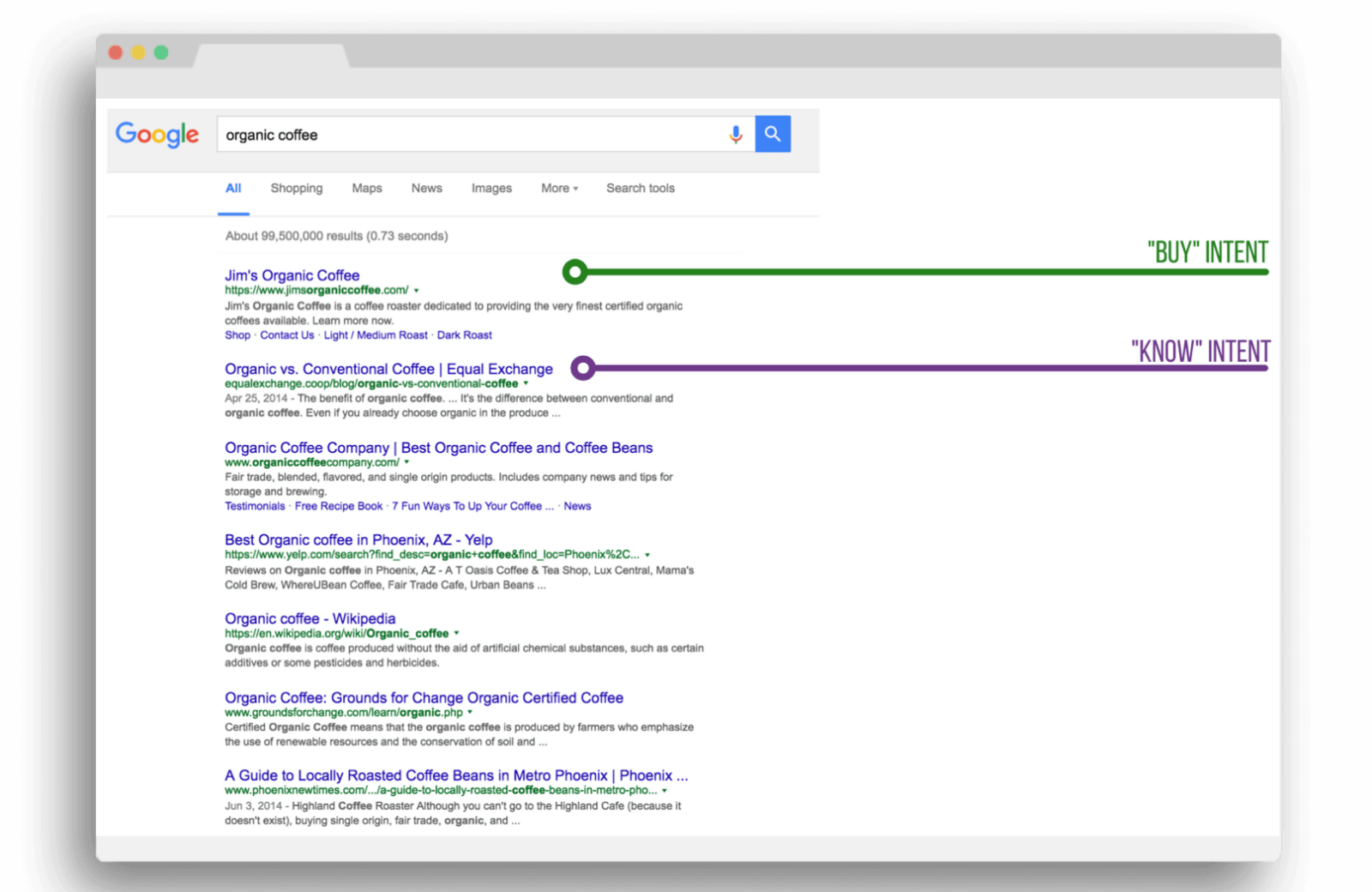 Screenshot from search for [organic coffee], Google, July 2021
Screenshot from search for [organic coffee], Google, July 2021Based on what is in results, Google believes the searcher’s intent could either be to purchase fair trade coffee or to learn more about it.
In this case, the page you’re trying to optimize can be targeted toward either intent.
Advertisement
Continue Reading Below
Here’s another example:
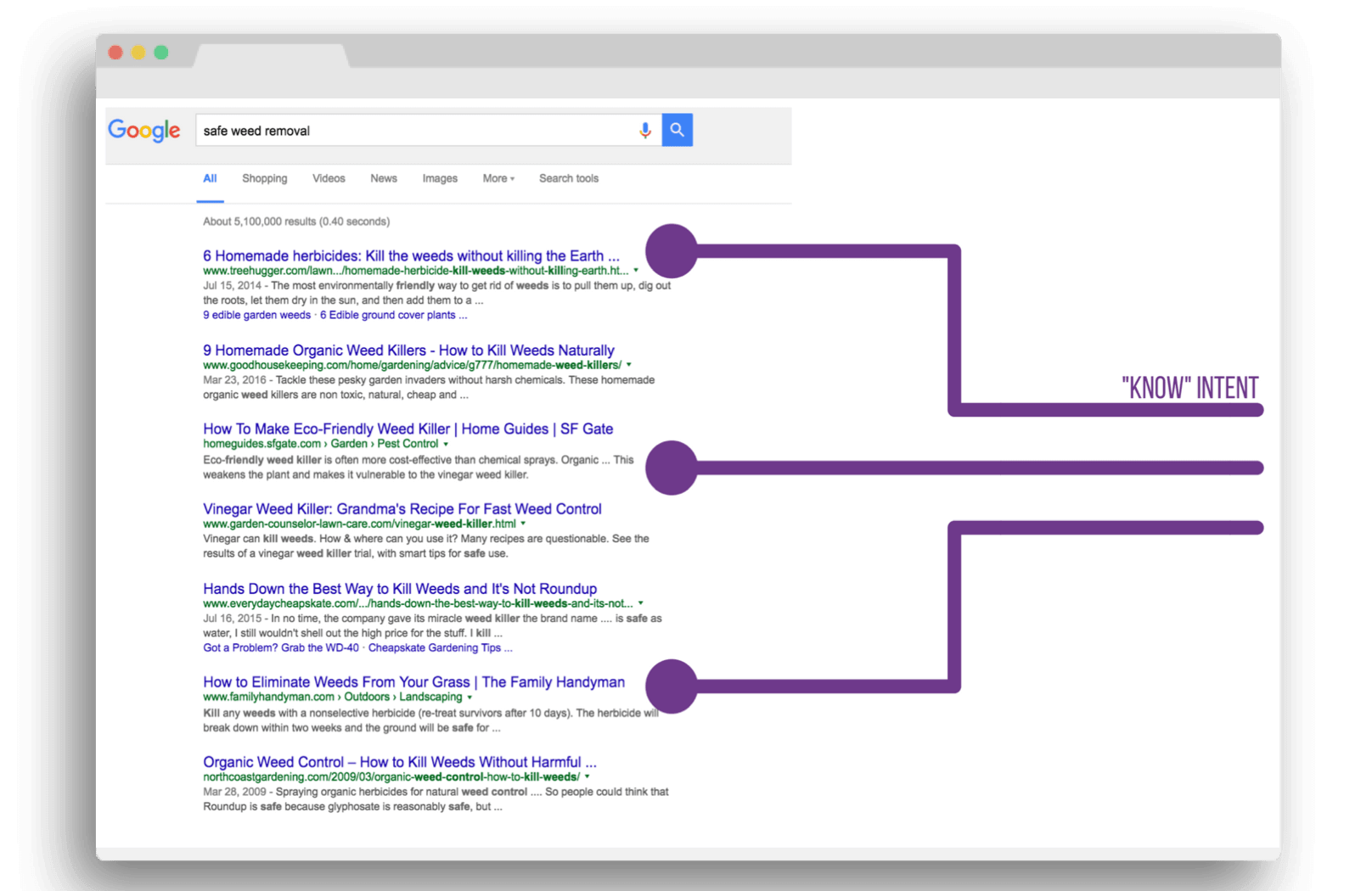 Screenshot from search for [safe weed removal], Google, July 2021
Screenshot from search for [safe weed removal], Google, July 2021In this scenario, if you were targeting the keyword [safe weed removal], you would create and/or optimize a page that provides information (or, in other words, satisfies the “know” intent).
Many tools can help you determine what pages are ranking for your targeted keywords, including SpyFu, SERanking, and Semrush.
You would simply click through them to determine the intent of the pages.
5. Go from Keywords to Questions
People search for questions.
That’s not newsworthy, but we should be capitalizing on all of the opportunities to answer those questions.
Therefore, don’t ever forget about the long-tail keyword.
Advertisement
Continue Reading Below
Some of my favorite tools to assist in finding questions are:
- AnswerthePublic.
- Question Analyzer by BuzzSumo.
- AlsoAsked.com.
AnswerThePublic uses autosuggest technology to present the common questions and phrases associated with your keywords.
It generates a visualization of data that can help you get a better feel for the topics being searched.
With this tool, you get a list of questions, not to mention other data that isn’t depicted below:
 Screenshot from Answer the Public, July 2021
Screenshot from Answer the Public, July 2021The Question Analyzer by BuzzSumo locates the most popular questions that are asked across countless forums and websites, including Amazon, Reddit, and Quora.
Advertisement
Continue Reading Below
Want to know what people ask about “digital marketing”? You can get that information and sort by question type:
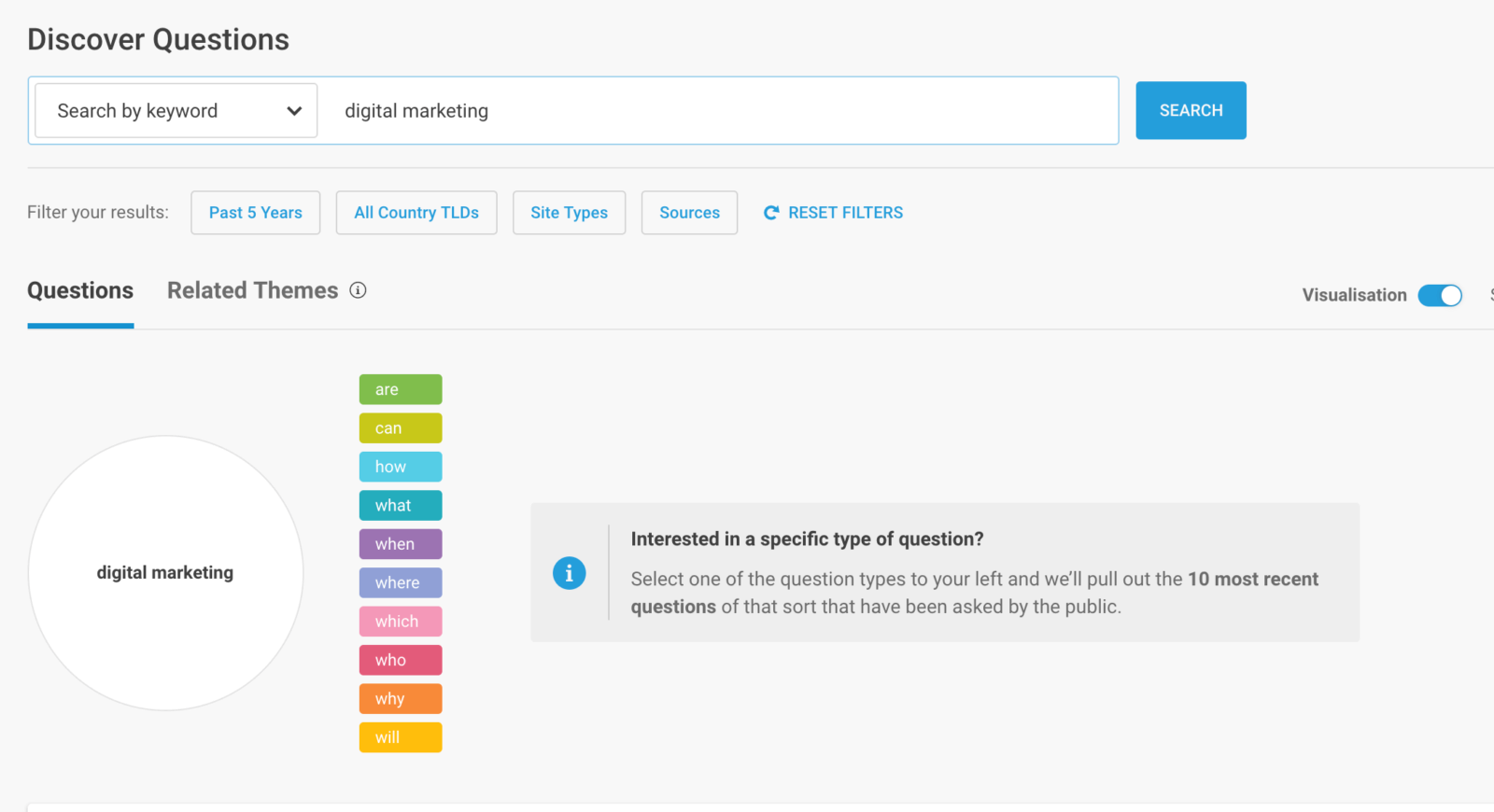 Screenshot from Question Analyzer by BuzzSumo, July 2021
Screenshot from Question Analyzer by BuzzSumo, July 2021AlsoAsked.com is another tool that helps identify questions.
It is based on Google’s People Also Ask data.
The tool provides insight into long-tail searches – the relationships between topics and questions.
Below is an example of what you might see on AlsoAsked.com.
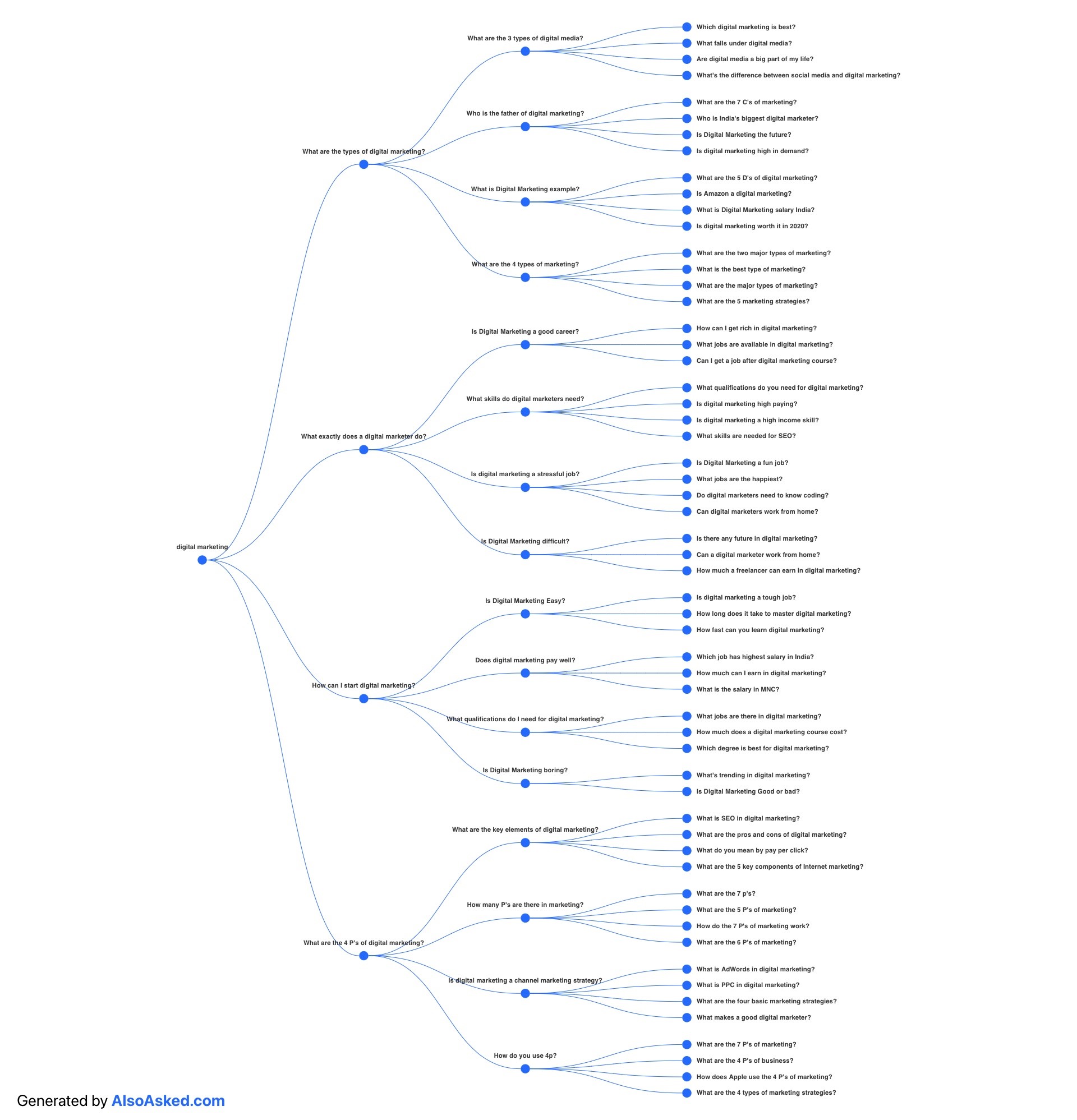 Screenshot from People Also Ask, July 2021
Screenshot from People Also Ask, July 2021Final Thoughts
New techniques and tools are always helping make our jobs easier.
Advertisement
Continue Reading Below
Your main focus should be on how to get customers to your website, which is done by knowing how to draw them in with the right keywords, questions, and content.
Featured Image: Paulo Bobita/Search Engine Journal
if( typeof sopp !== "undefined" && sopp === 'yes' ){ fbq('dataProcessingOptions', ['LDU'], 1, 1000); }else{ fbq('dataProcessingOptions', []); }
fbq('init', '1321385257908563');
fbq('track', 'PageView');
fbq('trackSingle', '1321385257908563', 'ViewContent', { content_name: 'tools-techniques', content_category: 'seo ' });

